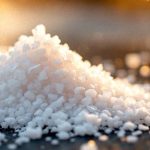Takeaways:
- CoQ10 is essential for cellular energy production
- It acts as a powerful antioxidant in the body
- CoQ10 supports heart health and function
- Statin users may benefit from CoQ10 supplementation
- Natural CoQ10 levels decrease with age
- Supplementation can address potential deficiencies
What is Coenzyme Q10?
Coenzyme Q10, or CoQ10, is a naturally occurring substance found in every cell of the human body.[1] It plays a crucial role in generating energy within cells, specifically in the mitochondria, which are often referred to as the cell’s powerhouses.[2]
The human body produces CoQ10, but its production decreases as people age.[3] Certain health conditions can also lead to lower levels of this compound. Due to this decline, many people consider using CoQ10 supplements.
CoQ10 has two key functions within the body: it helps in the production of energy and it functions as an antioxidant.[4] As an antioxidant, it protects cells from damage caused by unstable molecules called free radicals.[7]
The Science Behind CoQ10
Cellular Energy Production
CoQ10 is vital for the creation of cellular energy. It participates in the electron transport chain, a critical step in cellular respiration. This process converts the food you consume into usable energy.
In the electron transport chain, CoQ10 facilitates the movement of electrons between different complexes.[5] This electron transfer creates a gradient that drives the production of ATP, which is the primary source of energy for cells.
If CoQ10 is not present, the energy production process would not work correctly. Tissues that require a large amount of energy, such as the heart, have the highest concentrations of CoQ10.[6]
| Stage of Cellular Respiration | CoQ10’s Role |
|---|---|
| Glycolysis | Not directly involved |
| Citric Acid Cycle | Not directly involved |
| Electron Transport Chain | Transfers electrons between complexes |
| Oxidative Phosphorylation | Helps create proton gradient for ATP synthesis |
Antioxidant Properties
Besides its role in energy creation, CoQ10 is also a potent antioxidant. It works by neutralizing harmful free radicals, which can cause damage to cells, proteins, and even DNA.
The antioxidant action of CoQ10 is helpful in protecting cells from oxidative stress. This type of stress is associated with many long-term diseases and aging. By lessening oxidative stress, CoQ10 might help support overall health.
CoQ10 is particularly good at protecting cell membranes.[8] It works in conjunction with other antioxidants like vitamin E to maintain cell health. This protection also extends to lipoproteins, which carry cholesterol in the bloodstream.
- Neutralizes free radicals
- Protects cell membranes
- Reduces oxidative stress
- Supports other antioxidants
Natural Sources of CoQ10
Although the body creates CoQ10, you can also obtain it through diet. However, the amounts in food are generally lower compared to supplements. Still, a diet with CoQ10-rich foods can contribute to overall levels.
The body’s ability to make CoQ10 starts to decline around age 30 and continues to decrease as people get older.[9] Certain medical conditions and some medications can also reduce CoQ10 levels in the body.
| Food Source | CoQ10 Content (mg per 100g) |
|---|---|
| Beef heart | 11.3 |
| Sardines | 5.8 |
| Pork | 2.4 |
| Chicken | 1.4 |
| Spinach | 0.7 |
| Broccoli | 0.6 |
Organ meats such as heart, liver, and kidney have high amounts of CoQ10.[10] Oily fish like sardines and mackerel are also good sources.[11] For those who don’t eat meat, whole grains and certain vegetables contain smaller amounts of CoQ10.
The way you cook foods can influence the amount of CoQ10 they contain. Cooking with high heat tends to lower CoQ10 levels, while gentler methods such as steaming may help retain more of the compound.[12]
CoQ10 and Heart Health
Cardiovascular Benefits
CoQ10 has gained attention for its potential benefits for heart health. The heart is a very active organ and requires a consistent energy supply to function correctly.
Studies indicate that CoQ10 may help support heart function in several ways, potentially helping to lower blood pressure in some individuals.[13] This might be linked to its role in promoting healthy blood vessel function.
Some research has explored the use of CoQ10 for individuals with heart failure, a condition where the heart struggles to pump blood effectively.[14] CoQ10 may help improve heart function in these cases.
CoQ10 might also help reduce oxidative stress in the heart, which could protect heart cells from damage. However, further research is needed to fully understand these effects.
Statins and CoQ10
Statins are commonly used medications to reduce cholesterol levels and are widely prescribed to improve heart health. However, statins can lower CoQ10 levels in the body by interfering with the pathway that produces it.[15]
Some people who take statins report experiencing muscle pain or weakness, which may be related to lower CoQ10 levels.[16] Doctors sometimes recommend CoQ10 supplements for individuals using statins to help address these issues.
However, the evidence supporting the idea that CoQ10 can reduce side effects from statins is not consistent. More research is needed to confirm this potential benefit. Always consult your doctor before starting any new supplement.
- Atorvastatin (Lipitor)
- Simvastatin (Zocor)
- Rosuvastatin (Crestor)
- Pravastatin (Pravachol)
CoQ10 Supplementation
Forms and Dosage
CoQ10 supplements are available in two primary forms: ubiquinone and ubiquinol.[17] Ubiquinone is the oxidized form of CoQ10, while ubiquinol is the reduced form, and some believe it is more easily absorbed by the body.[18]
The recommended dosage of CoQ10 varies based on the reason for supplementation. General dosages range from 100 to 200 mg daily, but some situations may require higher doses.[19] It’s crucial to follow the guidance of a healthcare professional.
- Consult with a healthcare provider
- Choose between ubiquinone and ubiquinol
- Start with a lower dose and increase gradually
- Take with a meal containing fat for better absorption
- Be consistent with daily intake
Absorption and Bioavailability
CoQ10 is a fat-soluble substance, which means it’s absorbed better when taken with fats.[20] Taking CoQ10 alongside a meal that includes fats can improve absorption. Some supplements are formulated with oils to enhance absorption.
The body’s ability to absorb CoQ10 can vary from person to person. Factors such as age, metabolism, and overall health can influence absorption. Certain supplement formulations are designed to improve bioavailability.
- Take with a meal containing fat
- Consider soft gel capsules for better absorption
- Look for formulations with enhanced bioavailability
- Be consistent with daily intake
Potential Benefits Beyond Heart Health
Energy and Exercise Performance
Given CoQ10’s role in energy production, it has been studied for its potential impact on exercise performance. Research indicates it may help reduce fatigue and improve the ability to exercise.[21]
Athletes and active individuals have shown interest in CoQ10 for its potential to help reduce muscle damage from intense exercise. However, study results have varied, and more research is needed to confirm these benefits.
For individuals with chronic fatigue syndrome, CoQ10 has shown some promise in helping to improve feelings of fatigue.[22] However, more studies are required to reach definitive conclusions.
Brain Health
Due to CoQ10’s antioxidant characteristics, researchers are exploring its potential benefits for brain health. The brain is particularly vulnerable to oxidative stress, and CoQ10 might help protect brain cells from this type of damage.[23]
Some studies are investigating CoQ10 for neurodegenerative diseases, such as Parkinson’s disease.[24] While initial results are encouraging, more research is necessary to determine if CoQ10 might help slow the progression of these conditions.
There is also interest in CoQ10 for its possible impact on cognitive function, as cognitive abilities can decline with age. CoQ10 might help support brain health during aging, but the evidence in this area is still limited.
Skin Health
CoQ10 is often included in skincare products. Its antioxidant properties make it a desirable ingredient for skin health, as CoQ10 levels in the skin decrease with age and sun exposure.[25]
Applying CoQ10 to the skin may help reduce signs of aging by protecting against UV damage and reducing wrinkles.[26] However, more research is needed to confirm these effects.
Some individuals take CoQ10 supplements with the goal of improving skin health. The idea is that increasing CoQ10 levels throughout the body may benefit the skin, but the evidence supporting this approach is limited.
Safety and Side Effects
CoQ10 is generally considered safe for most individuals. Studies lasting several years have not shown any serious side effects. However, as with any supplement, there are some potential risks to be aware of.
The most common side effects are mild and may include digestive issues such as nausea or diarrhea.[27] Some people might experience headaches or skin rashes. These effects are usually mild and resolve on their own.
- People with chronic diseases should consult a doctor
- Those on blood thinners should use caution
- Pregnant or breastfeeding women should avoid CoQ10
- People with low blood pressure should monitor their levels
CoQ10 has the potential to interact with certain medications.[28] It could change how the body processes some drugs, so it’s essential to inform your doctor about any supplements you are taking.
CoQ10 Deficiency
While uncommon, a deficiency in CoQ10 can occur. This is more likely in older individuals or those with specific medical conditions.[29] Genetic factors can also lead to CoQ10 deficiency.
Symptoms of CoQ10 deficiency can vary and might include fatigue, muscle weakness, and cognitive difficulties. In severe cases, it can affect heart and lung function. However, these symptoms are not specific and could have multiple causes.
- Aging
- Certain genetic disorders
- Some medications (like statins)
- Nutritional deficiencies
- Excessive stress
Diagnosing CoQ10 deficiency typically requires blood tests.[30] However, these tests are not routinely performed. If you suspect a deficiency, it is best to consult with a healthcare provider.
Choosing and Using CoQ10 Supplements
When choosing a CoQ10 supplement, quality is important. It’s best to select products from reputable manufacturers. Third-party testing can offer reassurance about the quality and purity of the supplement.
Consider the form of CoQ10 included in the supplement. Ubiquinol may be more easily absorbed, particularly in older adults, though it is often more expensive than ubiquinone.[31]
For the best results from CoQ10 supplementation, consistency is key. Take it at the same time each day, ideally with a meal. It may take several weeks to notice any effects.
- Choose a reputable brand
- Consider the form (ubiquinone vs ubiquinol)
- Start with the recommended dosage
- Take with a meal containing fat
- Be consistent with daily use
- Monitor for any side effects
- Consult a healthcare provider if needed
Frequently Asked Questions
What is the difference between ubiquinone and ubiquinol?
Can CoQ10 interact with medications?
How long does it take to see benefits from CoQ10 supplementation?
Is CoQ10 suitable for vegetarians and vegans?
Can CoQ10 help with migraines?
What’s the connection between CoQ10 and fertility?
Conclusion
Coenzyme Q10 is a crucial compound that plays a critical role in energy production and functions as an antioxidant in the body. Its potential benefits are broad, extending from heart health to brain function and beyond.
While our bodies produce CoQ10 naturally, levels decrease as we age. This decline has led to interest in CoQ10 supplementation. Research indicates it might offer benefits for heart health, especially for those with existing heart conditions or those taking statin medications.[34]
CoQ10’s involvement in energy production has led to an interest in its effects on exercise performance and fatigue. Its antioxidant properties have prompted studies into its potential for brain health and skin care.
While generally considered safe, CoQ10 supplements may have side effects and can interact with certain medications. It is recommended to consult with a healthcare provider before beginning any new supplement regimen.
As research continues, more information will likely emerge about the potential benefits and uses of CoQ10. For now, it remains a promising supplement for individuals looking to support their heart health and overall energy levels.
It’s important to remember that supplements, while potentially beneficial, are not a substitute for a healthy diet and lifestyle. A balanced approach to health, including a nutritious diet, regular exercise, and appropriate supplementation when needed, is the best route to overall well-being.
CoQ10 is a vital component of cellular respiration and energy production, hence its presence in every cell.
CoQ10 is a key component of the electron transport chain within the mitochondria, where ATP, the cell’s main energy currency, is produced.
The body’s ability to synthesize CoQ10 diminishes over time, generally starting in middle age.
CoQ10’s dual roles include its participation in the electron transport chain and its ability to neutralize harmful free radicals.
CoQ10 is a mobile electron carrier, crucial for the transfer of electrons that generate the proton gradient to produce ATP.
The heart’s constant activity and high energy demand result in a greater need for CoQ10, leading to higher concentrations in the tissue.
CoQ10 can neutralize free radicals, which can damage cellular components, thus offering protection from oxidative stress.
As a lipid-soluble antioxidant, CoQ10 is positioned in cell membranes to prevent oxidative damage.
While the decline may vary, CoQ10 synthesis typically starts to decrease in the 30’s and continues as aging progresses.
Organ meats, due to their metabolic activity, are rich in CoQ10.
Oily fish contain good levels of CoQ10, making them useful dietary options.
CoQ10 is sensitive to heat, so high temperature cooking can degrade it. Gentler cooking methods such as steaming are better to retain CoQ10
Clinical trials and meta-analyses have shown that CoQ10 may positively affect blood pressure and heart function. Rosenfeldt, F. L., et al. (2007)
Source: “Coenzyme Q10 for heart failure” https://www.ncbi.nlm.nih.gov/pmc/articles/PMC8092430/
Several studies have explored CoQ10 as a possible adjunct therapy for heart failure, with some positive results. Mortensen, S. A., et al. (2014)
Source: “Effect of coenzyme Q10 in Europeans with chronic heart failure: A sub-group analysis of the Q-SYMBIO randomized double-blind trial” https://www.ncbi.nlm.nih.gov/pmc/articles/PMC8086660/
Statins inhibit the mevalonate pathway, which is necessary for both cholesterol and CoQ10 production.
While not definitively proven, some research suggests that statin-related muscle issues might be exacerbated by decreased CoQ10 levels.
Both forms are readily available as supplements.
Ubiquinol is more readily absorbed than ubiquinone, especially in older adults or those with absorption issues.
Dosage may be adjusted based on the individual’s health condition and their healthcare provider’s recommendations.
As a fat-soluble compound, CoQ10 is best absorbed when ingested with fat containing foods.
Research has explored CoQ10’s potential to enhance exercise and reduce fatigue. Mizuno, K., et al. (2008)
Source: “Coenzyme Q10: Clinical Applications beyond Cardiovascular Diseases” https://www.ncbi.nlm.nih.gov/pmc/articles/PMC8156424/
While more research is needed, some trials have shown CoQ10 can provide benefits to individuals with chronic fatigue
The brain’s high metabolic rate and lipid content make it particularly vulnerable to free radical damage and CoQ10’s antioxidant properties may protect against this. Beal, M. F. (2002)
Source: “The role of nutrition in Alzheimer’s disease.” https://pubmed.ncbi.nlm.nih.gov/33882663/
Some preliminary studies have suggested that CoQ10 may have potential benefits in neurodegenerative conditions, such as Parkinson’s, but more research is required.
CoQ10 levels in skin decrease due to age and sun exposure, so its inclusion in skincare aims to counter this. Knott, A., et al. (2015)
Source: “Topical treatment with coenzyme Q10-containing formulas improves skin’s Q10 level and provides antioxidative effects” https://pubmed.ncbi.nlm.nih.gov/26648450/
Studies suggest CoQ10 can protect against UV damage and reduce wrinkles, but more research is required.
Digestive issues are the most frequently reported side effects, but they are usually mild and do not require intervention.
CoQ10 may interact with blood thinners, some anti-diabetic medications, and blood pressure medications, so a healthcare provider should be consulted before starting CoQ10 supplementation
CoQ10 deficiency is not common, but can occur due to certain genetic conditions, nutritional issues, or diseases.
CoQ10 levels are assessed through blood tests, as symptoms are nonspecific.
Due to its reduced state, ubiquinol is often preferred for those with absorption issues or older age groups, at the cost of being more expensive.
Some studies have indicated the potential for CoQ10 to reduce the frequency of migraines. Sândor, P. S., et al. (2005)
Source: “Coenzyme Q10 Effects in Neurological Diseases” https://www.ncbi.nlm.nih.gov/pmc/articles/PMC9054193/
Some research suggests that CoQ10 may improve sperm quality in men and egg quality in women, but more conclusive results are needed. Xu, Y., et al. (2018)
Source: “Pretreatment with coenzyme Q10 improves ovarian response and embryo quality in low-prognosis young women with decreased ovarian reserve: a randomized controlled trial” https://pubmed.ncbi.nlm.nih.gov/29587861/
Studies have explored CoQ10’s role in supporting heart function and for managing potential side effects from statin use.



